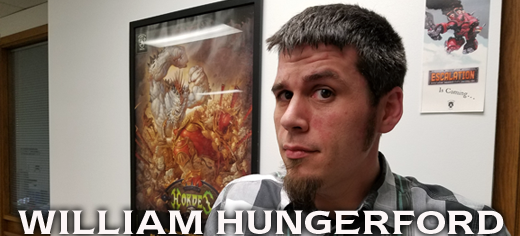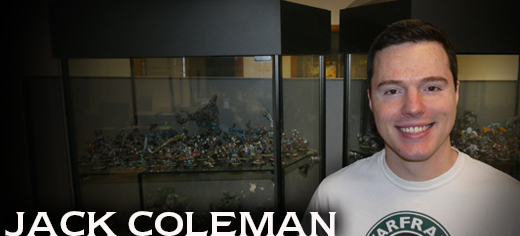
Insider 09-19-2016

Hey, you! Ever thought you’ve got what it takes to be an official Privateer Press playtester? Well, here’s your chance!
That’s right, ladies and gentlemen! It’s that rare magical time when we extend an open call for new playtest groups. Spots are limited, and only the best of the very best feedback-giving groups will be welcomed in. And when I say limited, I mean…REALLY limited. So, put forth your best effort if you’re interested in joining the team.
For those of you who have been around for some time, you’ll remember that years ago, we put out a playtest call using a special brew of models known as the Uniherd. Well, more good news: the tradition continues. It’s time to finally unveil the newest fake HORDES Faction: Merpandas!
I’ve mentioned these foul aquatic tyrants many times on the forums, Insiders, Primecast, etc., and now they have become reality. When the dev team discussed creating a group of fake models to use as a playtest-test, I immediately jumped on the opportunity to develop the Merpandas.
At the end of this Insider, you’ll find a link to a development test document containing rules for a Merpanda warlock, some warbeasts, a couple of units, and a couple of solos. Those of you interested in becoming playtesters will be doing so with the Merpanda models instead of any actual real models to be released in the future. That way, we can skip all that messy NDA business (unless your group is approved, of course).
I’m going to hand things off to our Playtest Coordinator, Jack Coleman, to discuss how to submit your group’s feedback, what we’re looking for in a playtest group, and how to give great feedback.
Be warned, though: the Merpanda rules are filled with things to throw you off. In fact, I intentionally designed some of them very, very wrong. It’ll be up to you to figure out what exactly is off and to provide the proper feedback.
Good luck! Take it away, Jack!

Hello, everyone! As Hungerford mentioned, my name is Jack Coleman, and I am in charge of internal and external testing at Privateer Press. I have been working at Privateer and playtesting for eight years, and I have had the pleasure of seeing WARMACHINE and HORDES transition into two new editions during my time here.
So without further ado, let’s talk about playtesting.
What Is Playtesting?
The word playtesting is kind of a misnomer. Good playtesters are not really playing a game of WARMACHINE; they are running an experiment. The goal of this experiment is to test model balance and rules interactions. The winners and losers of these games are not important at all. In fact, the proper mind set for playtesting is that both players win if they generate useful feedback, and both players lose if they do not.
Indeed, it is the playtesters’ job to work together as partners during a playtest session. Playtesting is not a competition, and the skill of the individual players is not being tested. Testers need to work as a team, reminding each other of relevant rules and discussing their tactics openly to ensure an accurate test of the rules in question. Testers need to be willing to rewind the game state, discuss the situation with their partners, and approach each issue from multiple directions.
Playtesting is hard work with the goal and the responsibility of making a superior finished product.
What Makes a Good Playtester?
There are a few key traits we look for in our playtesters.
Knowledge—A deep understanding of the rules and mechanics of WARMACHINE and HORDES is obviously required, but the best playtesters have a broad understanding of every Faction and are capable of playing those models well. This grants them a wide perspective that reduces Faction bias and provides a solid foundation that helps them understand new rules and mechanics on a fundamental level.
Communication—Playtesters must be able to express their thoughts in a clear and positive manner. When I say positive, I don’t mean you have to agree with everything you see and tell us it’s wonderful. What I mean is that instead of saying “This model is total crap and is literally unplayable!” you should say “This model is underpowered for its point cost because of X and Y, and I would recommend increasing its Z, based on this model’s most common targets.”
Professional conduct—The nature of playtesting a competitive game like WARMACHINE means there will be disagreements. If you are too hot headed and emotional to treat your fellow testers and Privateer staff members with dignity and respect, you will quickly find yourself removed from the program.
Dedication—Playtesting is a big commitment. We need testers who can reliably post feedback and keep up with the constant changes throughout a playtest cycle. If your group cannot post feedback at least three times a month, then you do not have enough time to participate in this program.
What Is Good Feedback?
Without good feedback, a playtest session is worthless. Playtesters should discuss their observations during and after the game, come to conclusions, and submit their feedback immediately while it is still fresh in their minds.
Feedback needs to be constructive, objective, and clearly state the strengths and weaknesses of the models along with any recommended changes. Your feedback should be concise and organized in a way that is easy to digest. The formatting and organization of your feedback can greatly influence how beneficial it is to the development team.
Not all changes are of equal magnitude. A new ability that could wreck havoc on the tournament meta is a much bigger concern than the difference between DEF 9 or DEF 10 on a new colossal. Make sure you organize your feedback with a clear indication of its importance.
Playtesters need to balance being clear with being concise. It is not necessary to write a novella explaining every minute detail of your battle report just to prove that RAT 4 is too low for a new shooty unit. In a similar vein, saying that something is “bad” or “overpowered” without further explanation doesn’t give development anything to work with. Testers need to clearly explain the root of an issue without getting buried in the details.
We learn nothing from “gotcha” moments, a misjudged charge distance, or lucky dice rolls. Capitalizing on your partners’ misunderstandings or mistakes does not actually teach us about the models and rules in question. On a similar note, rolling above average does not prove a model is overpowered any more than rolling below average proves it is weak. Playtesters must work together to ensure the feedback they are generating is based on the rules of the models in question instead of on their personal capabilities or the RNG inherent in a dice game.
Theory is not testing! We encourage group discussions and debate but analyzing and theory crafting will only get you so far. While it is easy to demonstrate a hypothesis anecdotally, we learn much more from seeing these theories played out in a variety of different circumstances.
Avoid hyperbole; using exaggerated emotional words or bad math will only hinder your argument. We are looking for logical and constructive feedback. We understand that you are passionate about WARMACHINE and HORDES (why would you apply to be a playtester if you aren’t?), but keeping calm and objective will enable you to provide feedback that will be taken seriously.
Details
If you and your friends are interested in playtesting, please download the attachments and follow the instructions given in the Application & Instructions document.
- Applications and feedback must be submitted by October 3rd.
- Playtest groups must consist of at least four members.
- Playtest groups must be willing to run 3–4 playtest sessions each month.
Application Instructions
Merpanda Playtest Document (.pdf)
